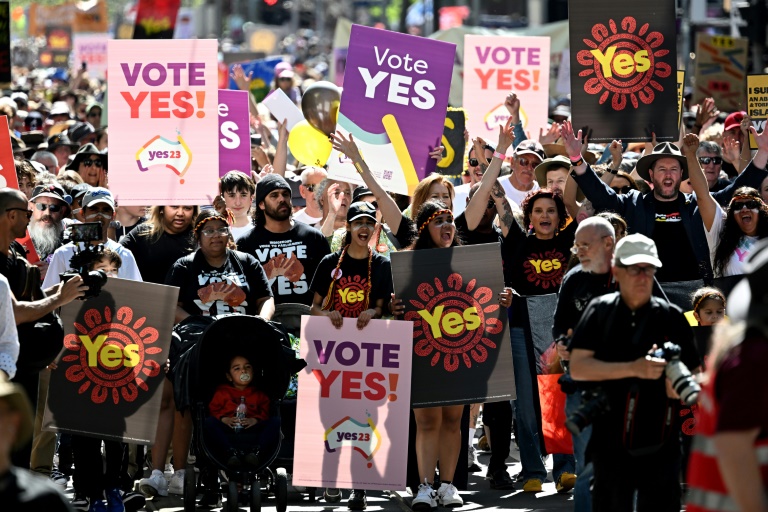Australians rallied around the country on Sunday to fight for a landmark Indigenous rights reform that is bleeding support in the polls before an October 14 referendum.
Thousands joined “Walk for Yes” events in major cities, ahead of the vote that could grant Indigenous Australians a constitutionally enshrined right to be consulted on policies that affect them — a so-called Voice.
More than 200 years since British colonisation, Indigenous people — whose ancestors have lived on the continent for about 60,000 years — have shorter lives than other Australians, poorer education and are far more likely to die in police custody.
“I think we need a voice in parliament and I think it’s about time,” said Laurel Johnson, a 58-year-old retired Indigenous community services worker who joined hundreds of people at the Sydney rally, many seeking shade during a spring heatwave.
Asked if the Voice would improve the lot of Indigenous people, she said: “I jolly well hope so.”
Her sister Priscilla Johnson, 53, said some Indigenous people lived in “Third World” conditions.
“Australia is considered a First World country. The poor social determinants of health have been continuous since the 1788 invasion,” she said, referring to the landing of the First Fleet, which established a British penal colony in Australia.
Supporters of the Voice, who also gathered in Melbourne, Canberra, Perth, Brisbane, Darwin, Hobart and Alice Springs, say a “yes” vote would help address those inequalities.
Backers of the Voice, a signature policy of Prime Minister Anthony Albanese’s centre-left government, face an uphill task.
Recent surveys show about 60 percent against the reform versus 40 in support — a near reversal of the situation a year ago.
The “yes” camp launched a television advertising campaign over the weekend featuring an Indigenous boy who asks: “Will I grow up in a country that hears my voice? Will I live as long as other Australians? Will I get to go to a good school?”
Cameron Lum, a 34-year-old supporter of the Voice proposal, said he joined the Sydney rally to support “long overdue change in this country”.
“I think it opens doors to massive policy change led by first nations people,” he said.
Opponents of the proposal say it would confer special privileges on Indigenous peoples while adding an unnecessary layer of bureaucracy.
They complain there is insufficient detail about the Voice, which would be drawn up by parliament if the “yes” case prevails.
To pass, the referendum needs majority support across Australia, but also a majority in at least four of the six states.
Voting is compulsory, with non-voters who don’t have a valid reason liable to a fine of 20 Australian dollars (US$13).
Voters will be asked: “A Proposed Law: to alter the Constitution to recognise the First Peoples of Australia by establishing an Aboriginal and Torres Strait Islander Voice. Do you approve this proposed alteration?”.
AFP






